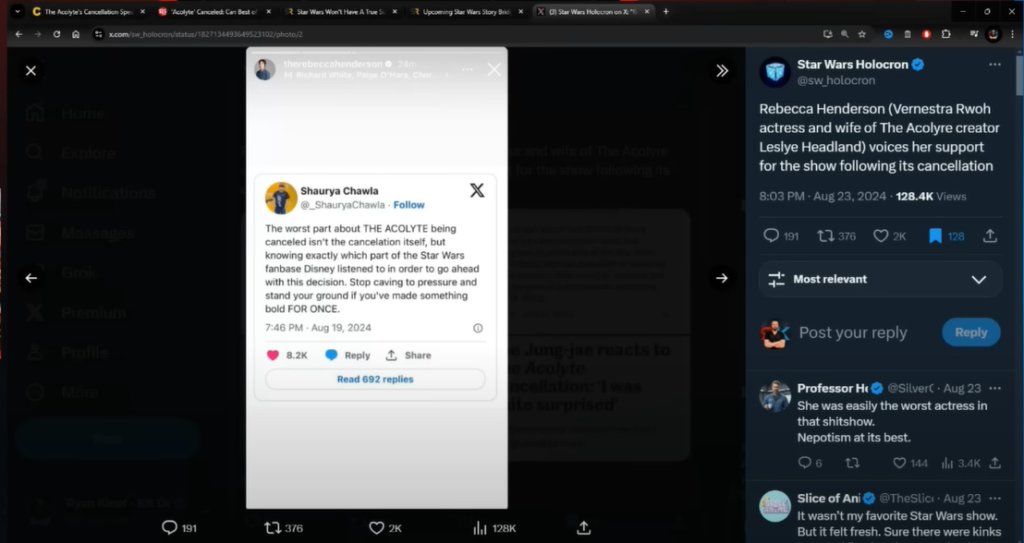In a dramatic turn of events following the cancellation of Disney’s Star Wars series The Acolyte, Rebecca Henderson, actress and wife of showrunner Leslye Headland, has sparked controversy by publicly blaming fans for the show’s demise. The situation has ignited heated discussions across social media, with fans and critics alike weighing in on the ongoing tension between creators and the Star Wars fandom.
The Fallout from “The Acolyte” Cancellation
When The Acolyte was abruptly canceled by Disney, it wasn’t long before the blame game began. Mainstream media outlets, including Rolling Stone, quickly published articles suggesting that toxic elements within the Star Wars fanbase played a significant role in the show’s failure. These accusations pointed to fans who had been critical of the direction the franchise was taking under Disney, labeling them as racist, misogynistic, and resistant to change.
Rebecca Henderson’s Reaction
Amidst this media frenzy, Rebecca Henderson, who played the character Vestra Ro in The Acolyte, stepped into the spotlight. However, her connection to the show runs deeper than just her role on screen—Henderson is also married to Leslye Headland, the show’s creator and showrunner. In a bold move, Henderson echoed the media’s sentiments, sharing articles and tweets that criticized fans for their supposed role in the show’s downfall.
One of the most striking moments came when Henderson shared a Rolling Stone article that blamed Star Wars fans for The Acolyte’s cancellation. The article portrayed the fanbase as intolerant and unwilling to embrace the new direction Disney was taking the franchise. Henderson’s endorsement of this narrative only fueled the fire, as she essentially aligned herself with the media’s portrayal of the fans.

The Blame Game
Fans React
Unsurprisingly, Henderson’s comments sparked a strong reaction from the Star Wars fanbase. Many fans felt unfairly targeted, arguing that their criticisms of the show were valid and not rooted in bigotry or intolerance. Instead, they pointed to issues like poor storytelling, unfaithfulness to the Star Wars legacy, and a perceived disconnect between the creators and the franchise’s core audience.
The backlash wasn’t just limited to social media. Fans took to forums and YouTube channels to express their frustration with what they saw as a pattern of creators and media outlets deflecting blame onto the audience rather than addressing the shortcomings of the content itself. The narrative that Star Wars fans are the problem has become increasingly common in recent years, leading to a growing divide between the franchise’s creators and its dedicated fanbase.
The Bigger Picture
The cancellation of The Acolyte and the ensuing controversy raise larger questions about the future of the Star Wars franchise. As Disney continues to navigate the delicate balance between appealing to long-time fans and attracting new audiences, the challenges of managing a passionate and sometimes divided fanbase become more apparent.
Rebecca Henderson’s public statements, while bold, reflect the frustration felt by many involved in The Acolyte. The show was ambitious, aiming to explore new territory within the Star Wars universe, but it ultimately failed to gain the widespread support it needed to continue. Whether or not fan backlash was the primary reason for its cancellation, the situation highlights the increasingly complex relationship between creators and their audiences in the modern entertainment landscape.
What’s Next?
As the dust settles, all eyes are now on Leslye Headland, the showrunner of The Acolyte, who has yet to publicly comment on the cancellation. Fans and critics alike are eager to hear her perspective on what went wrong and how she plans to move forward. Will she echo her wife’s sentiments, or will she offer a different explanation for the show’s untimely end?
In the meantime, the Star Wars franchise will continue to evolve, with new projects on the horizon. But the fallout from The Acolyte’s cancellation serves as a reminder that, in the world of Star Wars, the relationship between creators and fans is as important as the stories being told. Whether Disney and its creative teams can rebuild trust with their audience remains to be seen, but one thing is certain: the force of fan opinion is not to be underestimated.
Rebecca Henderson’s decision to publicly blame fans for the cancellation of The Acolyte has added another layer of complexity to an already contentious situation. As debates continue to rage online, the incident serves as a microcosm of the broader challenges facing the Star Wars franchise. Navigating these challenges will require a careful balancing act between respecting the legacy that has made Star Wars a global phenomenon and embracing the new directions that will keep it relevant for future generations. Only time will tell if that balance can be struck.
